
臺灣非營利專業書評媒體。Openbook編輯部將提供原生報導,文化觀察,人物採訪與國內外重大出版消息。 https://linktr.ee/openbooktaiwan
Topic" Heroes who transcend ordinary people, do they really care about human society? The "Guardian" is smooth on the surface and complicated on the inside, and the pictures and texts are perfectly matched
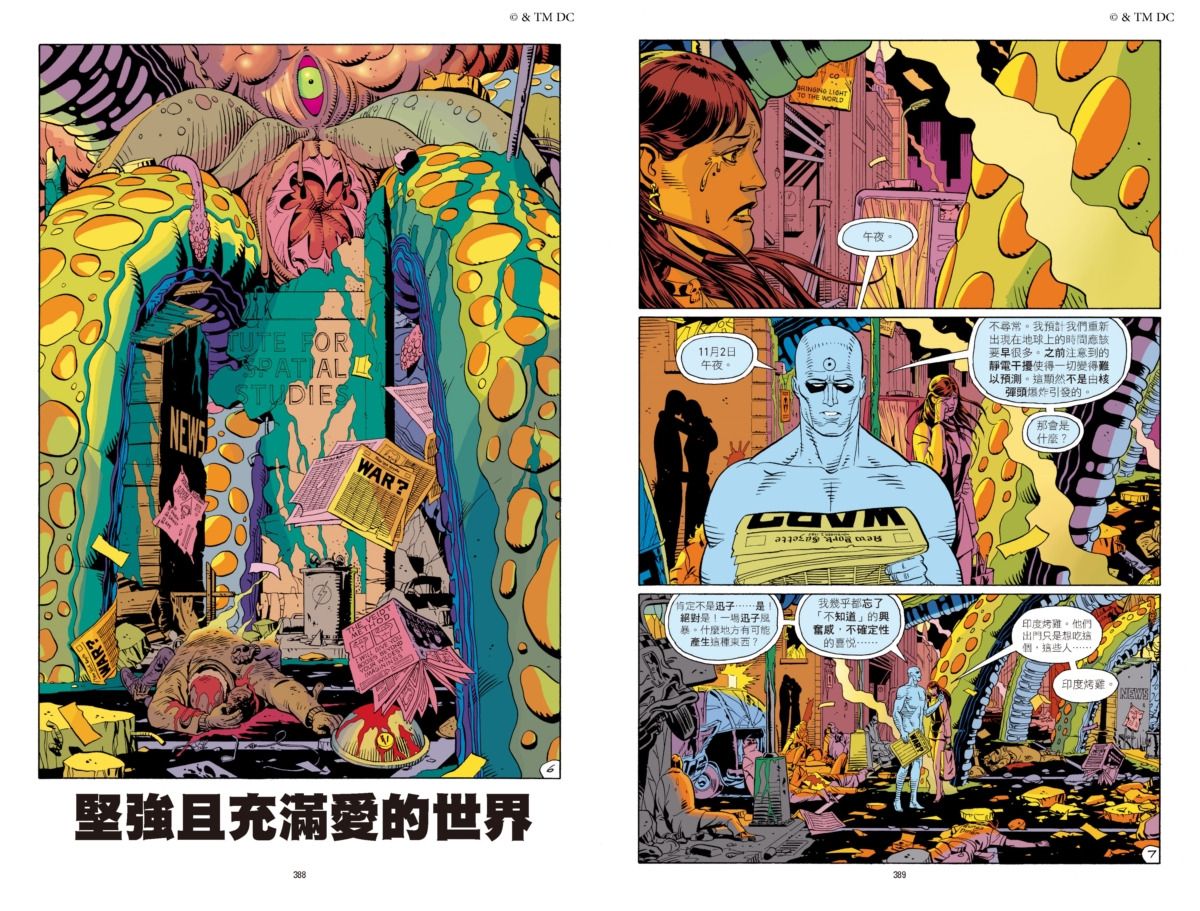
In 1985, in New York City, the United States, two police detectives were investigating a murder scene. The deceased was thrown from a high-rise residence by the murderer, smashed the tempered glass, and fell to his death. The police detectives discussed the deceased's good relationship with the top government officials while discussing from the room, and at the same time discussed how to keep the case low-key, so as not to attract unnecessary attention from some people. That night, a man in a trench coat and a fancy hood climbed into the murder scene from the outer wall of the building with a hook-rope gun, found a hidden compartment behind the wardrobe, and confirmed that the deceased had a secret identity.
The Guardian story begins.

This opening has an obvious reasoning atmosphere - a clearer classification, this will be "hard-core" reasoning - the detective role discovers the secret identity of the victim, compared to the police detective who wants to deal with the case in a low-key manner, the detective should be better able to dig out the truth of the incident .
Both the man in the wonderful hood and the deceased fought crime as masked vigilantes, but the 1977 Keane Act made masked vigilantes illegal, so the two chose completely different ways to deal with the bill: One teamed up with top government officials to become special agents, while the other continued to hunt down criminals with underground operations. Now one of the two has become a corpse, and the other thinks that in addition to finding the real murderer, he should also warn other partners who were also masked vigilantes: there may be a killer eyeing us.
As the men in the wonderful hoods visit their old friends one by one, the plot begins to develop in multiple lines, and readers will soon realize that: "Guardian" uses a reasoning skeleton, but in addition to solving the mystery and arresting the murderer, screenwriter Alan Moore wants to talk about There are many more.
For example "Superhero".
Today's impression of "superheroes" is mostly from American comics, but similar concepts can be found in creations both ancient and modern, and at home and abroad. The superheroes in American comics have several characteristics: most of them have some kind of ability, most of them hide their true identities in various disguises, and most of their "going heroes" do not meet the legal norms. That is, superheroes may be doing something for the "right" purpose, but the means of doing it are "illegal".
The main characters of "Guardian" are a group of masked "heroes" - in fact, several countries in the real world do have such people currently operating everywhere, and the police in various countries do not like them. Of course they don't have superpowers. If they are doing some public welfare activities, that's all. If they really try to get involved in criminal investigations, they may cause a lot of problems. Whether it's the public power units in the system or the general public, how do they treat them? Actions are not necessarily acceptable. This situation has long been foreshadowed in The Guardian.
Moreover, there really is a superpower in "Guardian".
The "power" of superheroes belongs to the discussion of the relationship between individuals and society, while the matter of "having powers" belongs to another aspect of thinking - are people with superpowers still "humans"? As far as most creators of American comics are concerned, the answer is yes. Even if their superheroes come from extraterrestrials, they are still full of various human natures, and many times they need to face the same life problems as mortals.
But "Guardian" proposes a sharp thinking direction: a person who has abilities that ordinary people do not have, can do things that ordinary people can't do, and who has certain senses, perspectives and experiences that are different from ordinary people, the thoughts and feelings will still be Is it the same as ordinary people? Is it possible that what he thinks and wants is beyond the realm of ordinary people? Such "people" who have surpassed mortals, will they still care about human society?
This is a topic rarely discussed in stories about "superheroes".
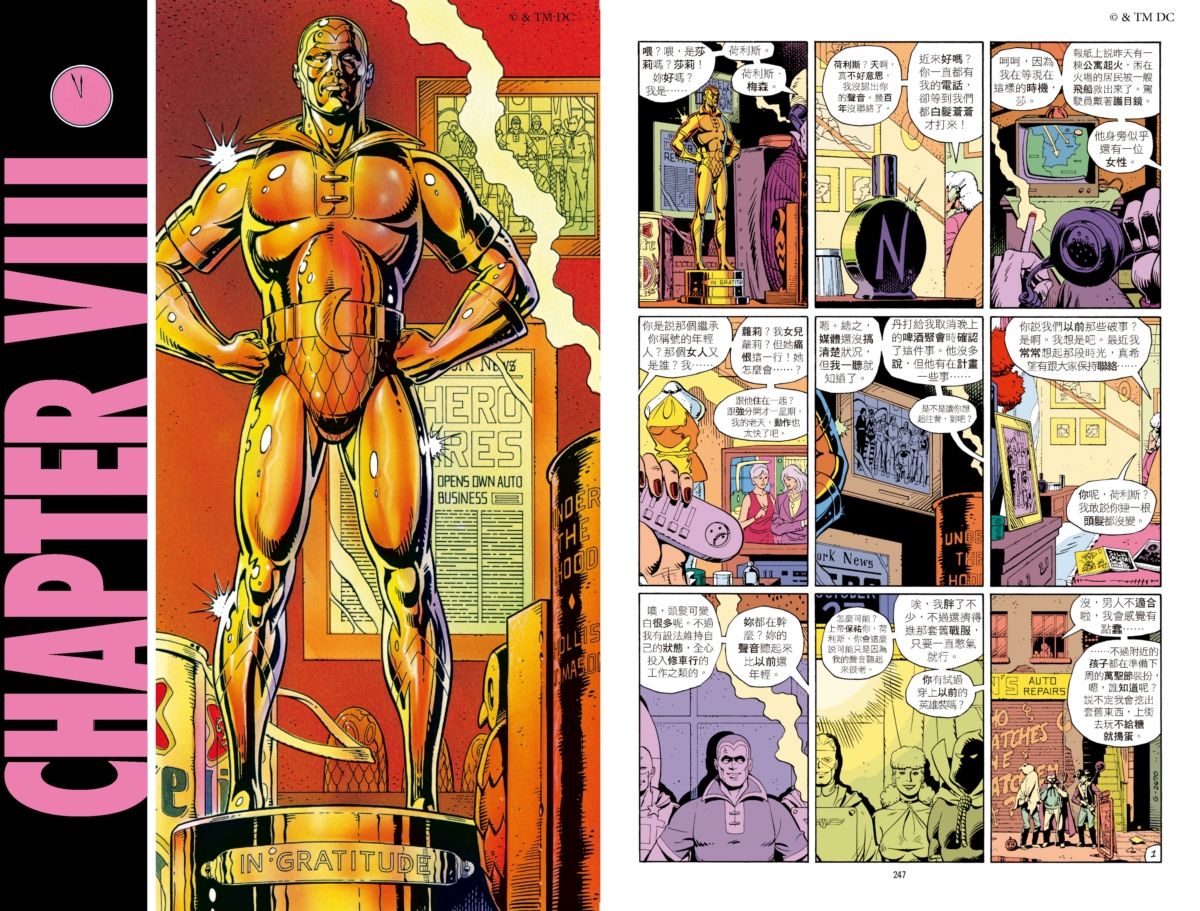
When "Guardian" started serialization, Moore once wanted to directly use the superhero characters that existed in the American comics company DC (Detective Comic) in the story. Later, DC did not agree with this idea, so the masked "Guardian" in "Guardian" The vigilantes were all designed by Moore. But those who are familiar with the superhero settings of the American comics will find out what methods Moore uses to dismantle the existing superhero settings and reshape his characters.
In addition, Moore pushed the issue further to one of the sources of superheroes in American comics-the ancestor-level superhero "Superman", whose prototype was born out of the "Bible". The extraterrestrial Superman was raised by Earth's adoptive parents to be a perfect example of personality, and his emotional relationship with several characters makes his "protecting the planet" behavior seem natural. But without these connections, how would superhumans, who are all superior to ordinary humans, view ordinary humans? From another perspective, when a person has dual identities, one is an ordinary person, and the other is a disguised hero who can ignore the law and execute lynch justice, how will he see himself?
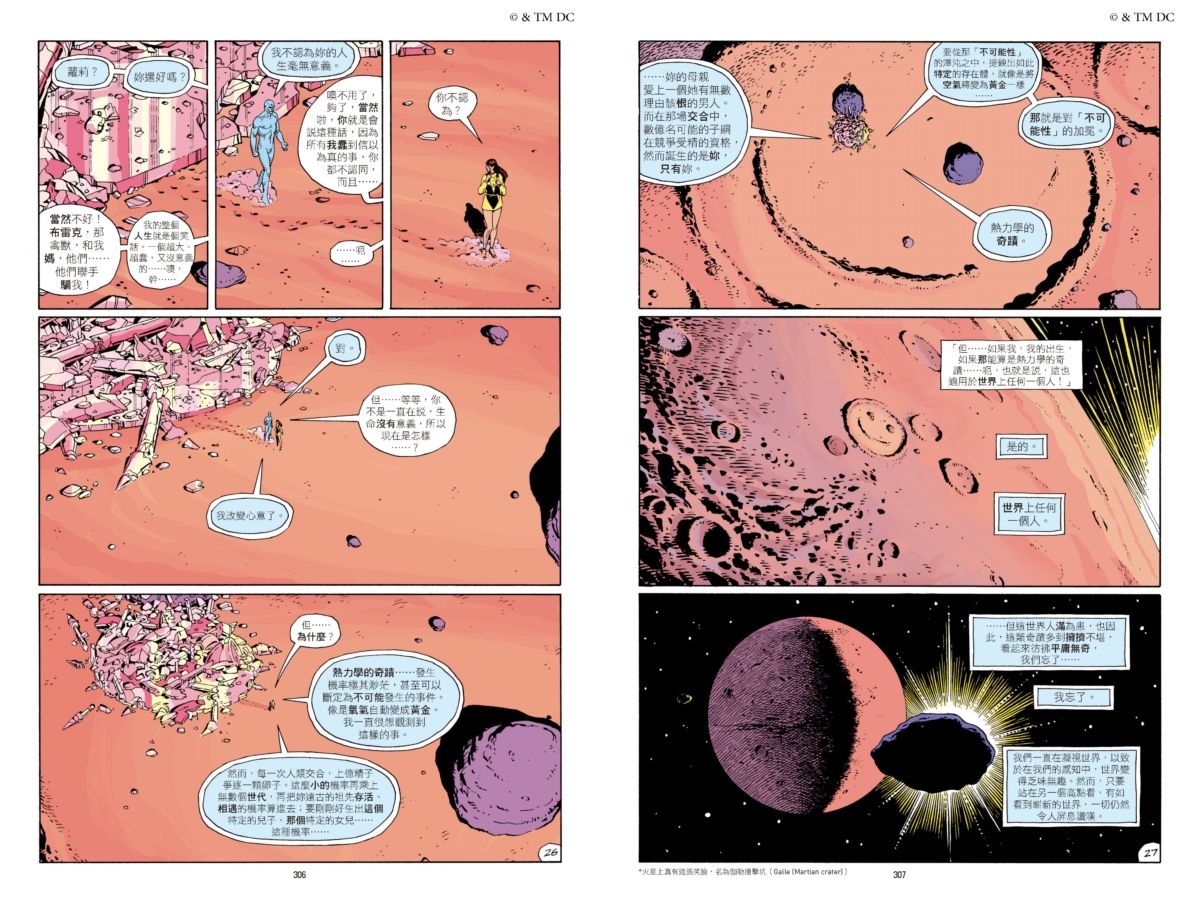
Moore is well versed in all kinds of superhero allusions, and not just superhero allusions.
If you like sci-fi, you may be very excited to read a character in "The Guardian" talking about "time", because that is a perfect reproduction of the time theory mentioned by Vonnegut in "Slaughterhouse Five" in 1969. In 1985's "Guardian", not only is it timeless, Jiang Fengnan's sci-fi short "The Prophecy of Your Life", which won three awards including the Nebula Award in 1998, also applied the same concept.
If you care about gay issues, you will find that "The Guardian" hides the development of the gay movement in the United States from the 1950s to the 1980s, as well as the public's views on individual sexual orientation.
Those interested in fields such as sociology, crowd psychology, etc., will see important social events that influenced this type of research inserted in The Guardian (though many years later, reports of that event proved not entirely true).
And if you are interested in the fields of literature, history and mythology, it will be a great pleasure to dig out the various allusions hidden in the story of "Guardian", which echo and contrast with each other, as well as different interpretations of the same set of words or words.
Even political and social structures.
The story of "Guardian" takes place in the late 1985, which is similar to the real world. The human society in the story is also at the end of the Cold War. The two major powers, the United States and the Soviet Union, each used nuclear weapons to maintain a balance of terror. The United States, which has had superpowers since World War II and before the Vietnam War, seems to be more capable of deterrence. It may be used by interested people. Peace under the balance of terror is not true peace. If human beings are expected to put aside their prejudices and move towards the future together, they must use some decisive means to force human beings to choose this only path.
In human history, when the regime oscillates between democracy and totalitarianism, it is always necessary to think: Is this the right thing to do? This kind of thinking can almost correspond to the previous discussion on superheroes: the purpose is right, but does it mean that the means of execution are also right?
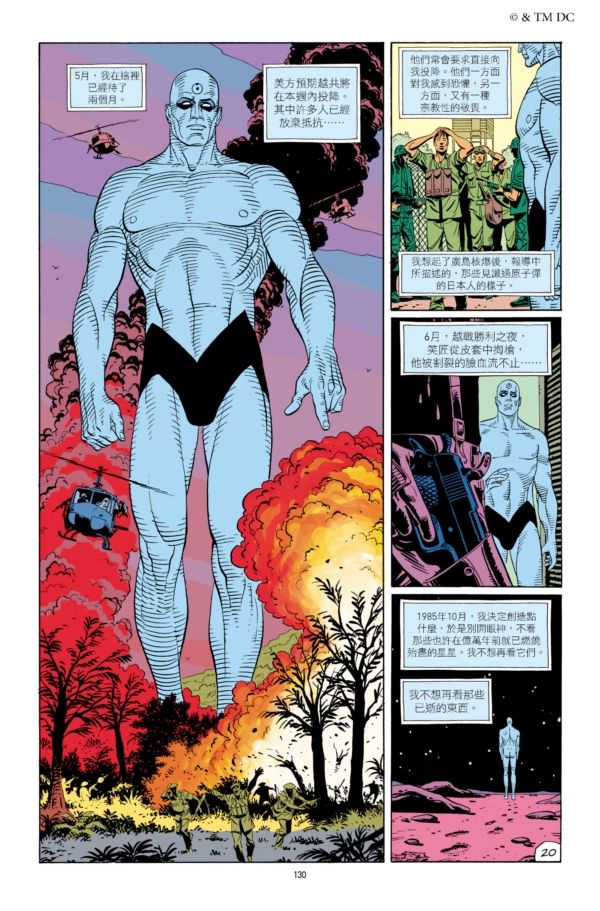
Although a huge amount of cross-domain and ingeniously linked information has been arranged, the main line of "Guardian" has not shifted.
Following the reasoning framework to the end, the real murderer and the unexpectedly huge conspiracy show a complete picture, but the next plot instantly subverts all "should be" imaginations, and the judgment of right and wrong is no longer simple. Geographically straightforward. All previous mysteries are solved here, but there is no certainty what to do to be considered justice. The ending of "Guardian" seems to have no standard answer to the "trolley problem". The options and the consequences that follow are very clear. There are reasons for choosing, but they will not be the best choice.
The Guardian is classified as a "graphic novel".
The difference between this genre and traditional "manga" is still unclear, but from the perspective of production, graphic novels are mostly stories that have been fully planned at the beginning of creation and are expected to end within a fixed number of phases; traditional commercial Comics are based on long-term, continuous serialization. In terms of content, graphic novels mostly deal with more serious issues, and the volume of text may also be relatively large.
Moore's use of words is ingenious and precise. The dialogue and dialogue, the dialogue and the frame, or even the background of the frame and the content of the "book" are connected to each other, and at the same time, the plot continues to advance, which is already a show of superb narrative techniques. And cartoonist Dave Gibbons' beautiful storyboards, transitions, detail processing and cross-page design not only make the picture and text closely integrated and assist each other, but also make the entire layout full of ingenuity worthy of careful study.
"Guardian" has been adapted into a live-action film, but Moore believes that the story cannot be presented in other ways than "comics" - the complete mosaic of pictures and text, the meaning embedded in the text, the allusions and the dark pictures. Buried messages, etc., are not suitable to be conveyed by moving images such as movies, and are more suitable for “reading” by slowing down the receiving rhythm.
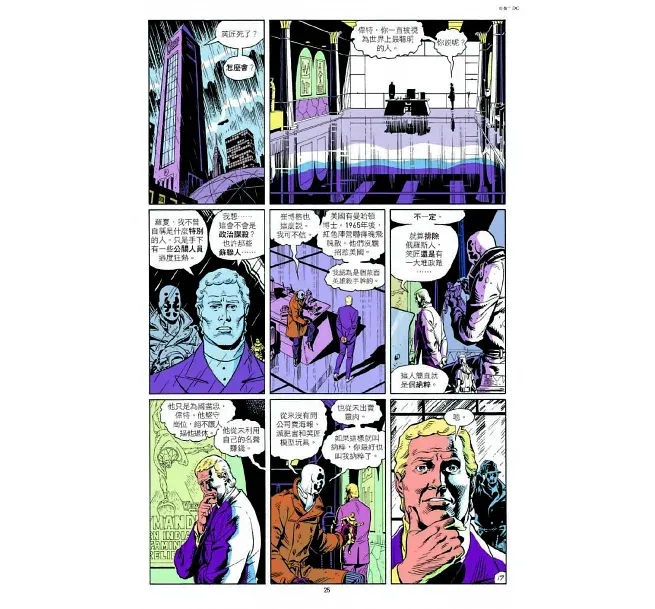
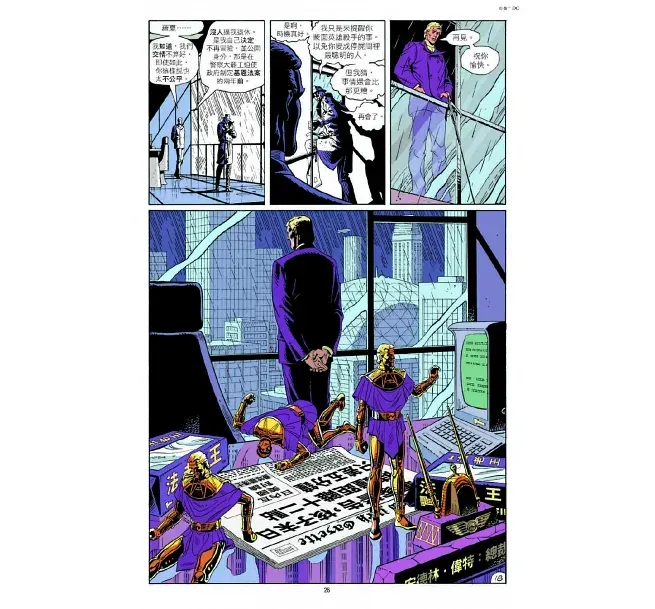
So, The Guardian is a good read, and one that deserves to be reread many times.
The American "Time" magazine once selected the ten best graphic novels published from 1938 to 2006, and "The Guardian" ranked first. In "Time" magazine's 100 best English novels from 1923 to 2005, "The Guardian" is also with "The Catcher in the Rye", "The Story of Meigang City", "Lord of the Flies", "1984", "The Lord of the Rings" " and other classic novels side by side.
For the time being, Ignoring this added halo, reading "The Guardian" itself can bring a lot of fun, because readers who love various types of stories can see the application and deformation of type elements every time, and readers who love various social science issues Every time, I can get reflection and dialectics of the discussion of the topic.
Moreover, even if you don't delve into the complexities, just looking at the surface, "Guardian" is already a very smooth and wonderful story. ●( The original text was first published on the OPENBOOK official website on 2022-08-15)

protector
Watchmen
Author: Alan Moore
Illustrator: Dave Gibbons
Translator: Sun Deqin Publishing: Trojan Horse Culture
Like my work?
Don't forget to support or like, so I know you are with me..
Comment…